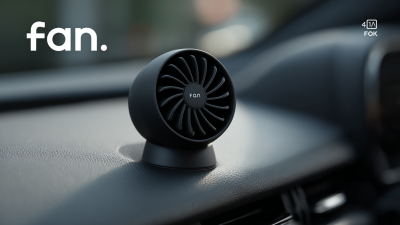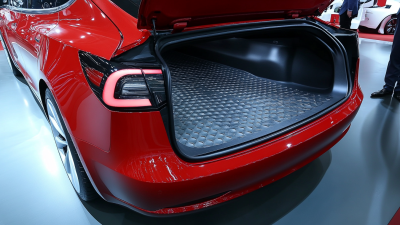When it comes to enhancing your driving experience, many people overlook the importance of "Fans for Cars." While most drivers are familiar with their basic function of regulating temperature, there are numerous other benefits that these fans can provide, far beyond mere comfort. In this guide, we will explore five compelling advantages of using fans for cars that you may not have considered. From improving air circulation to boosting fuel efficiency and even prolonging the lifespan of your vehicle's climate control system, the impact of fans in your car can be profound.

Discover how these often underestimated components can elevate your time behind the wheel and transform your overall driving experience. So let's dive in and uncover the hidden perks of incorporating fans into your automotive routine!
When it comes to enhancing comfort during road trips, the importance of effective air circulation cannot be overstated.
Fans in cars play a crucial role in regulating temperature and ensuring a pleasant environment for all passengers. Instead of simply relying on the vehicle's air conditioning system, adding a fan can significantly improve airflow, making those long drives far more enjoyable. With enhanced air circulation, you can avoid the stale air that often accumulates in enclosed spaces, leading to a fresher atmosphere that invigorates everyone in the car.
Moreover, fans can help in managing humidity levels, particularly during hot and muggy weather. High humidity can make the interior of a car feel stuffy and uncomfortable, leading to fatigue and irritability among passengers. A fan can help redistribute the air inside the vehicle, keeping moisture at bay and providing a more enjoyable ride. By creating a gentle breeze, fans not only provide immediate relief from heat but also maintain overall air quality, contributing to a more pleasant driving experience for everyone onboard.
When it comes to improving fuel efficiency in cars, temperature management plays a crucial role. A well-regulated temperature within the vehicle not only enhances comfort but also optimizes engine performance, leading to significant fuel savings. Recently, innovative systems, such as improved air conditioning designs that utilize solar energy, have emerged to enhance efficiency without sacrificing comfort. These systems manage thermal loads more effectively, allowing engines to operate at optimal temperatures and, consequently, improving fuel economy.

Moreover, incorporating fans in cars can further aid in controlling temperature, providing a simple yet effective way to enhance airflow and reduce reliance on air conditioning systems. By promoting better heat dissipation and ensuring cooler cabin temperatures, fans help maintain the overall system's efficiency. This thoughtful temperature management reduces energy wastage and contributes to lower emissions, supporting a greener driving experience. The integration of such technologies underscores a growing emphasis on sustainable practices in automotive design, reflecting the urgent need to address energy shortages and climate change.
Car fans play a crucial role in maintaining a comfortable driving environment by effectively reducing humidity and preventing fogging on windows. According to a study by the Society of Automotive Engineers, interior humidity levels can significantly impact driver visibility, with excessive moisture leading to potential safety hazards. By circulating air within the cabin, car fans help to stabilize these humidity levels, ensuring that the driver's line of sight remains clear and unobstructed during various weather conditions.

In addition, the presence of proper ventilation contributes to overall passenger comfort. Research by the National Highway Traffic Safety Administration indicates that interior fogging is a leading cause of distracted driving, resulting in thousands of accidents annually. By utilizing car fans, drivers can actively combat the buildup of condensation on windows, thus enhancing visibility and promoting safer driving practices. This simple yet effective tool provides an invaluable benefit that many drivers may overlook, highlighting the significant role of car fans in everyday vehicle use.
When it comes to enhancing air quality inside vehicles, the implementation of fans plays a crucial role. According to a study by the Society of Automotive Engineers, the air quality in a closed vehicle can deteriorate rapidly, with pollutant levels exceeding those found in outdoor environments by nearly five times. This alarming statistic emphasizes the need for effective circulation and filtration methods. Using fans in cars not only helps to filter out harmful particulates, such as pollen and dust, but also facilitates the circulation of fresh air to combat the build-up of carbon dioxide and other contaminants.
Incorporating fans into automotive design can significantly improve overall driver and passenger comfort. A report from the Environmental Protection Agency highlights that adequate ventilation in vehicles can reduce the occurrence of health issues related to poor air quality, including respiratory problems and allergies. By promoting constant airflow, car fans can help minimize the concentration of volatile organic compounds (VOCs) often released by interior materials, which are notorious for degrading indoor air quality. Thus, automotive fans serve not just as comfort features but vital health instruments that contribute to a safer and more enjoyable driving experience.
| Benefit | Description | Impact on Air Quality | Additional Advantages |
|---|---|---|---|
| Improved Ventilation | Fans help circulate air within the vehicle, preventing stagnation. | Increases fresh air intake and reduces moisture accumulation. | Enhances comfort during long drives. |
| Allergen Reduction | Fans can assist in filtering out dust and pollen as air circulates. | Reduces allergy symptoms for sensitive passengers. | Improves overall passenger health. |
| Odor Elimination | Fans help disperse unpleasant smells that may accumulate in the car. | Creates a more pleasant driving experience. | Contributes to a cleaner interior environment. |
| Temperature Regulation | Fans help maintain a comfortable temperature, especially in warmer weather. | Prevents overheating and discomfort during hot days. | Avoids the need for excessive air conditioning. |
| Energy Efficiency | Using fans can reduce reliance on air conditioning, saving fuel. | Promotes better energy consumption during travel. | Cost savings on fuel over time. |
When it comes to boosting performance in vehicles, fans play an essential role in addressing engine cooling challenges. Effective cooling solutions are critical, especially in high-performance racing scenarios, such as those faced by Williams in F1 2025. The heat generated by engines can lead to reduced performance and reliability, which is why innovative cooling technologies are being pursued. Utilizing fans not only helps maintain optimal engine temperatures but also enhances the overall efficiency of the vehicle.
**Tips for Maximizing Fan Efficiency:**
1. **Proper Placement:** Ensure that fans are strategically placed to circulate air effectively around the engine compartment, allowing for maximum heat dissipation.
2. **Regular Maintenance:** Keep the fans clean and free from obstructions to maintain airflow and prevent overheating. Scheduled checks can help identify potential issues early on.
The integration of fan technology with advanced simulation methods may also provide valuable insights into optimization. By predicting the performance of cooling systems through joint simulation and machine learning, automotive engineers can enhance the responsiveness and efficiency of fans, ensuring that vehicles consistently perform at their best even under extreme conditions.






